Dismantling Inequitable Practices through Cutural Inclusivity and Advocacy in the Math Classroom!
India White • March 5, 2024
Dismantling Inequitable Practices in the Math Classroom

Dismantling Inequitable Practices through Cultural Inclusivity and Advocacy in Math Education
Dr. India White
In the field of mathematics education, it is crucial for teachers to be aware of and actively work towards dismantling inequitable practices that exist in the educational system. To see malpractice and not advocate for those who have suffered is simple inhumane, and goes against the better part of a leader’s character. By promoting cultural inclusivity and advocating for all students, particularly those from marginalized groups, math teachers can create a more equitable and inclusive learning environment. This blog post will explore the importance of cultural inclusivity and advocacy in mathematics education, drawing on scholarly references to provide insights and strategies for math teachers.
Why Cultural Inclusivity and Advocacy Matter in Mathematics Education
Inequitable practices in mathematics education can manifest in various ways, including disparities in achievement, access to opportunities, and representation of diverse perspectives. These inequities often stem from systemic biases and cultural misunderstandings that perpetuate academic disparities among students. By embracing cultural inclusivity and advocating for all students, math teachers can address these inequities and create a more equitable and inclusive learning environment.
This can strengthen relationships in the classroom while convincing students that every classroom is a safe place where they can learn and thrive as an independent thinker.
Research has shown that culturally responsive teaching practices can improve student engagement, motivation, and achievement in mathematics (Gay, 2000).
By incorporating students' cultural backgrounds, experiences, and perspectives into the curriculum, math teachers can make the content more relevant and accessible to all students. Additionally, advocating for inclusive policies and practices within the educational system can help address systemic barriers that hinder the success of marginalized students in mathematics. This is simply necessary as educators aim to move towards greater proficiency level of all learners.
8 Tips and Instructional Practices for Math Teachers
1. Build Cultural Awareness
Teachers, be intentional about truly take the time to learn about the cultural backgrounds and experiences of your students. This can help you better understand their perspectives and tailor your instruction to meet their needs. Afterwards, take a moment to celebrate cultural differences and be intentional at protecting the authenticity of cultures and ethnic groups. In their journal Math at the Core: Culturally Responsive Teaching and Math, PBS Learning Media (2024) researchers focuses on student identity and how that can increase cultural awareness while building relationships with students from diverse backgrounds. They mention some questions to consider including:
These questions will help educators slow down enough to truly get to know each students and to frame instruction around various aspects of their culture and personalities so that all students will feel like they belong in the math classroom.
2. Incorporate Culturally Relevant Content
As you are building your lesson plans for the week, choose to integrate diverse perspectives and examples from different cultures into your mathematics curriculum. This can help students see themselves reflected in the content and make learning more engaging. Further, it will enhance self-efficacy of all learners while creating buy-in needed for collaboration throughout the learning experience. As a result, invisible “walls” will fall, and metacognition will flow in an environment all students can trust. Some ways you can build culturally relevant content has been discussed by Larry Ferlazo’s(2020) article in Ed Week titled “12 Ways to Make Your Classroom More Culturally Relevant”, and they include: “building community, student collaboration, role models, using manipulatives and literature, and giving complex work”. Not only do these strategies help with cultural relevance, it enhances rigor for each student in the learning environment.
3. Promote Equity in Group Work
As you are being thoughtful about how to empower student voice, and include all learners, be mindful of the dynamics within student groups and ensure that all students have an equal opportunity to contribute and learn from their peers. For instance, when assigning group work, choose to use various roles for students to make sure all students can participate in a fair manner. Further, use random ways to assign students into roles as well as for sharing out their ideas, (i.e. Popsicle sticks, Kagan groups, etc.). Double check with all students to ensure they feel like they feel like they belong and that they are being resourceful during various group activities.
Further, finding various ways to grade students in efforts to discover their unique traits while learning math can add value to each lesson. For instance, the use of culturally relevant rubrics is a clever way to approach the use of culture in the math classroom. In their blog titled, "Culturally Responsive Teaching Strategies for Inclusive Math,"
Carnegie Learning (2024) stated that “A cultural responsiveness rubric can help you evaluate if your math problems resonate with diverse cultures. It lets you gauge whether the task acknowledges different perspectives or merely reinforces stereotypes."
4. Provide Multiple Pathways to Success
When planning for success of your students each semester, recognize that students may have different learning styles and strengths. Offer multiple ways for students to demonstrate their understanding of mathematical concepts. As students are expressing various ways of how they came up with solutions or rationale, cease the opportunity to share it out with their peers and encourage thinking beyond the page and into real world scenarios.
As you think about ways to promote success in the classroom, provide various ways for students to express their learning. For instance, in their article, “How Do We Support Students in Reflecting on Mathematics”, Cynthia Dore (2017) spoke about how teachers can “provide opportunities for students to reflect on their learning and to increase their metacognition (their thinking about their thinking).” Dore elaborated on various methods, including having students participate in “think-alouds by having them work in pairs” and answering various questions including, “and reflect on their process for solving a math problem, addressing questions during reflection in the math classroom such as: “What steps did you take? What did you do when you ran into an obstacle? How did you check your answers?"
It’s imperative to also provide closure to each lesson via a math exit slip, reflection in a math journal, or a whole class discussion on what was taught and what should be discussed the next day.
5. Encourage Critical Thinking and Problem-Solving
When striving for true inclusivity, foster a classroom environment that values diverse perspectives and encourages students to think critically about mathematical concepts and real-world applications. It’s imperative that you become a defender against any comments, curriculum, or external content that would dehumanize any student or their background while they are discussing their thoughts about math in the classroom. Convince your students that your class is always a place where they will be protected and feel safe. In their article titled, “How to Encourage Critical Thinking in Math”, Mary Montero mentions these 3 strategies for teachers to consider:
6. Advocate for Students while Addressing Stereotypes and Biases
Addressing stereotypes and biases is not always an easy task for teachers. However, once it is addressed for the best interests of students, it can truly improve the learning environment by assisting in stronger advocacy for students and strengthening student confidence levels. In their article titled “Getting Students on the Road to Self Efficacy”, Adrienne Waller (2021) mentioned how students from marginalized backgrounds must learn how to take up self-advocacy in the classroom. They elaborate, stating that “Self-advocacy must be taught and encouraged. It benefits all students, but is particularly important for students who have been historically marginalized because of their cultural or language background, or because of a disability.”
Self-advocacy is essential as we strive to close the achievement gap and helps students navigate through their journey as learners. Along with teaching self-advocacy, teachers must always have a protective lens while choosing to challenge stereotypes and biases that may impact students' confidence and achievement in mathematics. Create a supportive and inclusive classroom where all students feel valued and respected. Be brave enough to have a conversation around how to protect the learning environment and to show equal love and support for all people.
While advocating for students, it helps strengthen their math identity altogether. In their article titled, “Getting Students on the Road to Self Advocacy, Adrienne Waller (2022) mentions how advocacy for students “makes learning manageable and prevents students from drawing global conclusions about their performance, such as “I am just not good at math.”
Further, Waller spoke about how student self-advocacy also benefits their teachers by assisting them with “the questions that students ask, the help they need…that can help teachers to fine-tune their instruction.” Further, self-advocacy helps you break outside of your comfort zone and take a positive “risk” and defy the odds as you hear from learners who you might not regularly call on. It also helps you sharpen your craft as an educator and think outside the box as to how you can make a positive example out of marginalized groups of learners.
7. Collaborate with Families and Communities
Engage families and communities in the learning process and seek their input on how to best support students from diverse backgrounds. Choose to reach out to families via surveys, parent nights, and other community events to find out opinions and recommendations from parents and guardians regarding how to best serve their children. Join with them to make sure all students have what they need to excel in school. In their blog on “8 Strategies for Culturally Responsive Family Engagement”, Brookes Publishing mentioned that in effort to connect with families, teachers should consider various ways to be culturally responsive including: conducting a cultural audit, acknowledge and interrupt implicit racial biases that are rooted in anti-Blackness, developing authentic, trusting relationships through home visits and more.
8. Advocate for Inclusive Policies
When discussing including, experts have defined inclusivity as, “a commitment to providing every student with equitable opportunities to engage with mathematical concepts, develop problem-solving skills, and achieve mathematical proficiency. It recognizes that learners come from diverse backgrounds, possess varying abilities, and learn in unique ways.” They also mention how when approaching inclusivity, there are various lenses a teacher can see inclusivity through and specific categories in which to approach inclusivity including: diverse student populations, varied learning styles, equity and access, individualized support, equity and social justice, real-world relevance, enhanced problem solving skills, and preparing for future careers for all learners, IEP Plans, assessments and more. Teachers, choose to do what’s best for all students and advocate for policies and practices that promote equity and inclusivity within the school and district. Be a voice for change and work towards creating a more equitable mathematics education system. Make sure that you are linked with other leaders who also support this work and can find ways to ensure that all students are being serviced in an equitable manner while also upholding policies within your district and or state.
Conclusion
By implementing these tips and instructional practices, math teachers can contribute to dismantling inequitable practices and promoting cultural inclusivity and advocacy in mathematics education. Through their efforts, teachers can create a more equitable and inclusive learning environment where all students have the opportunity to succeed in mathematics. Remember, as math teachers, your role extends beyond teaching mathematical concepts. You have the power to create a positive and inclusive learning environment that supports all students on their mathematical journey. Let's work together to dismantle inequitable practices and promote cultural inclusivity and advocacy in mathematics education.
Want more resources? Visit www.india-white.com for books, blogs, merchandise, or to schedule Dr. India White to speak at your district or an upcoming event. Read more about Dr. India White below!!
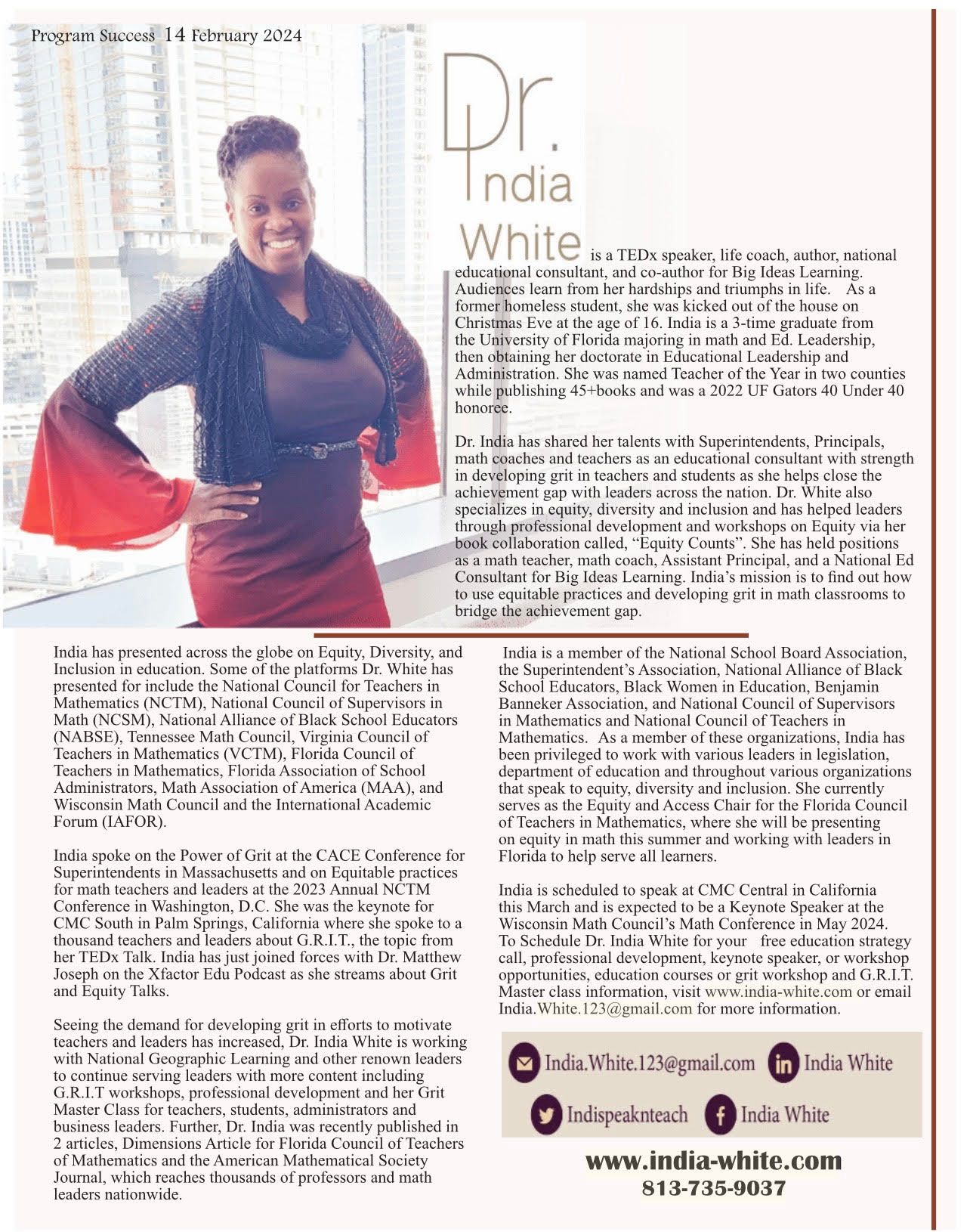

Coming Full Circle: Returning to Sarasota with Gratitude and G.R.I.T. I am filled with gratitude and emotion as I prepare to return to Sarasota; not just as a speaker, but as someone whose life was forever changed by the generosity, vision, and grit of this community. Many years ago, I stood on the other side of opportunity as a formerly homeless teen, supported by scholarships made possible by leaders and organizations—many of whom will be in the room when I return. Those investments were not just financial; they were votes of confidence. They said, “We see you. We believe in your future.” And that belief changed everything. To now come back and say thank you; not in words alone, but through purpose-driven work—is truly humbling. Honoring a Legacy of Advocacy and Impact This moment is especially meaningful as we continue the legacy of Rep. Detert, a tireless advocate for students, education, and formerly homeless youth like myself. Her leadership embodied what it means to pair policy with compassion and action with accountability. She didn’t just talk about equity—she fought for it. That legacy lives on in the leaders, educators, and community members who refuse to let circumstance define a child’s future. The G.R.I.T. of This Organization What stands out most about this organization and its leaders is their impeccable G.R.I.T.**—growth mindset, resilience, self-efficacy, and time invested wisely in people. This is not performative work. This is long-haul, legacy-building leadership. You don’t just open doors—you walk alongside young people until they’re strong enough to run through them. A Personal Thank You Returning to Sarasota is deeply personal. It is a reminder that when communities choose to invest in potential, the ripple effects last generations. I am living proof that grit grows when someone believes in you long enough to help you believe in yourself. Thank you for sowing seeds years ago. Thank you for continuing the work. And thank you for allowing me to return—not just to speak, but to honor a legacy that helped shape my life. This is full circle. And we’re just getting started. 💙

Grit Meets AI: Reflections from the Florida Distance Learning Association Conference This past week, I had the absolute pleasure of presenting at the Florida Distance Learning Association Conference, and I’m still energized by the conversations, questions, and passion I witnessed from professors and K–12 educators across the state and beyond. My session focused on G.R.I.T. and Artificial Intelligence in the math space (Grades K–12); and more importantly, how we can responsibly and intentionally use AI to strengthen learning rather than replace good teaching. G.R.I.T. + AI = Powerful Instruction During the session, I shared how my G.R.I.T. framework, Growth Mindset, Resilience, Self-Efficacy, and Time Management, can serve as a guardrail for AI integration in mathematics. AI is not here to do the thinking for* students; it’s here to help students think better. We explored how AI can: * Support productive struggle rather than shortcut it * Differentiate instruction while maintaining high cognitive demand * Build student confidence through feedback and reflection * Help teachers reclaim time without sacrificing rigor From elementary number sense to secondary algebra and beyond, AI—when paired with grit—becomes a powerful ally in equity-centered math instruction. A Call to Professors and Teachers Whether you teach future educators at the university level or students in a K–12 classroom, my encouragement is this: don’t fear AI—frame it. When grounded in pedagogy, purpose, and perseverance, AI can help us close gaps instead of widening them. If you’re preparing teachers, now is the time to model what ethical, effective, and gritty AI use** looks like in practice. Let’s Stay Connected If this message resonates with you, I invite you to continue the work with me: * 📘 Explore my books and G.R.I.T. resources designed for educators and leaders * 🎤 Book me to speak or lead professional learning for your school, district, or conference * 🌐 Visit my website for tools, courses, and upcoming events Together, we can ensure that innovation never outpaces intention—and that grit remains at the heart of learning in every classroom, whether in person or online. Let’s get gritty. Let’s get intentional. And let’s lead the future of math education—wisely and boldly. 💪📊🤖
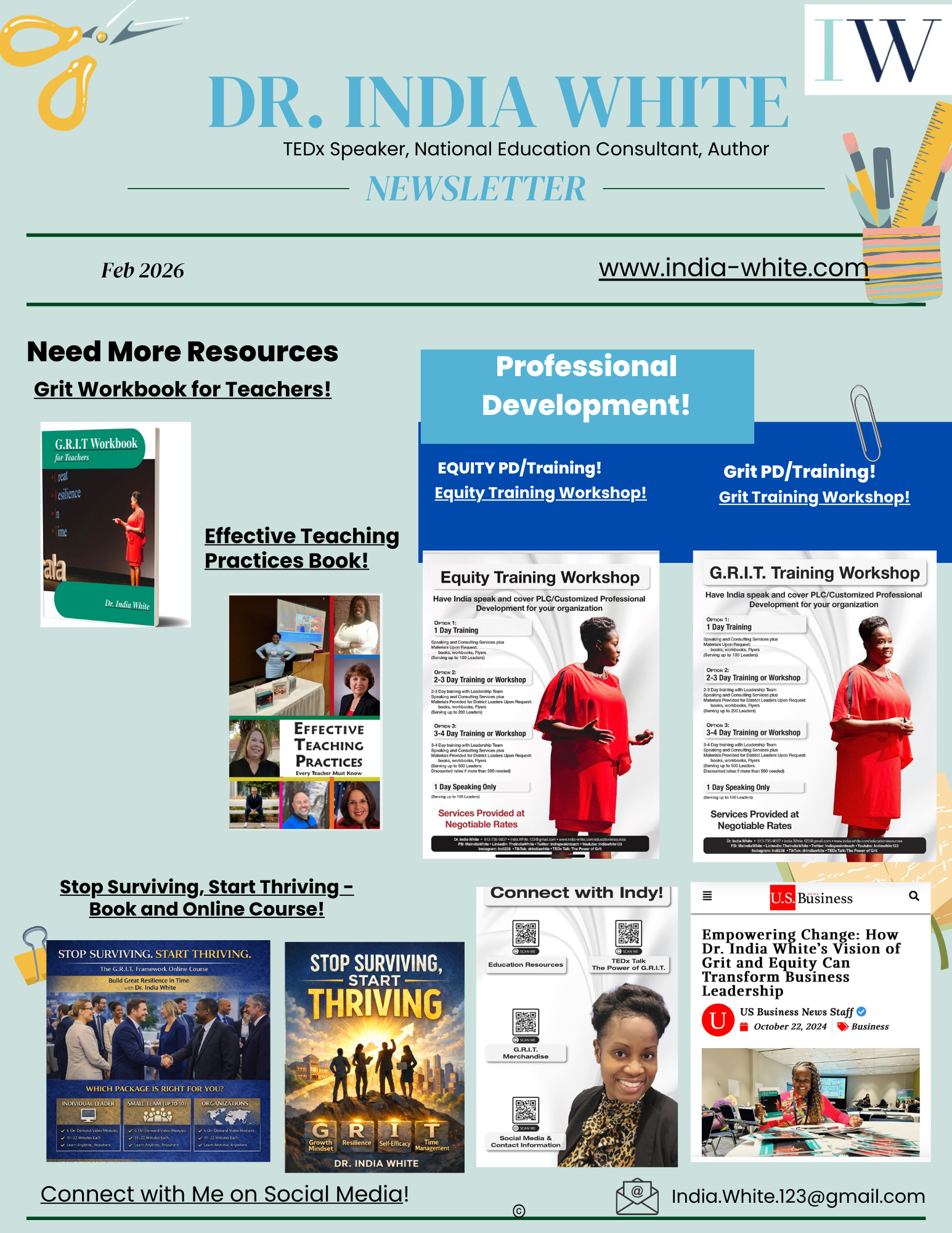
February Energy, Connection, and Celebration—Our Newsletter Is Live! 🎉 I’m so excited to share our February Newsletter, and whew—what a month it has already been! February has been full of learning, laughter, inspiration, and powerful connections, all while we celebrate Black History Month and continue the work of building equity and excellence in education. One of the biggest highlights this month was presenting aUtah Council of Teachers of Mathematics (UCTM)**. Connecting with educators in person in Utah was such a joy. The energy in the rooms, the thoughtful questions, the shared commitment to students—it reminded me why I love this work so much. Teachers showed up curious, gritty, and ready to grow, and I left feeling deeply encouraged. At the same time, I had the opportunity to connect with educators online through Florida Distance Learning Association (FDLA), and let me tell you—virtual spaces can be just as powerful! Engaging with teachers across distances, sharing ideas, and learning together in real time was an absolute blast. Whether in Utah or online, the common thread was clear: educators are hungry for tools that help students thrive. And February isn’t slowing down yet! I’m counting down the days as I prepare to serve as a keynote speaker for the Junior League of Sarasota at the end of the month. I’m truly honored and excited to share space with leaders who are committed to impact, service, and community transformation. This month’s newsletter captures all of that momentum—where I’ve been, what’s coming next, and how we can stay connected. If you haven’t checked it out yet, I invite you to take a look, share it, and reach out. Let’s collaborate, dream big, and keep building together. February is reminding me that connection fuels purpose—and I’m grateful for every educator, leader, and partner walking this journey with me. Let’s keep celebrating, learning, and getting gritty—together. 💛✨
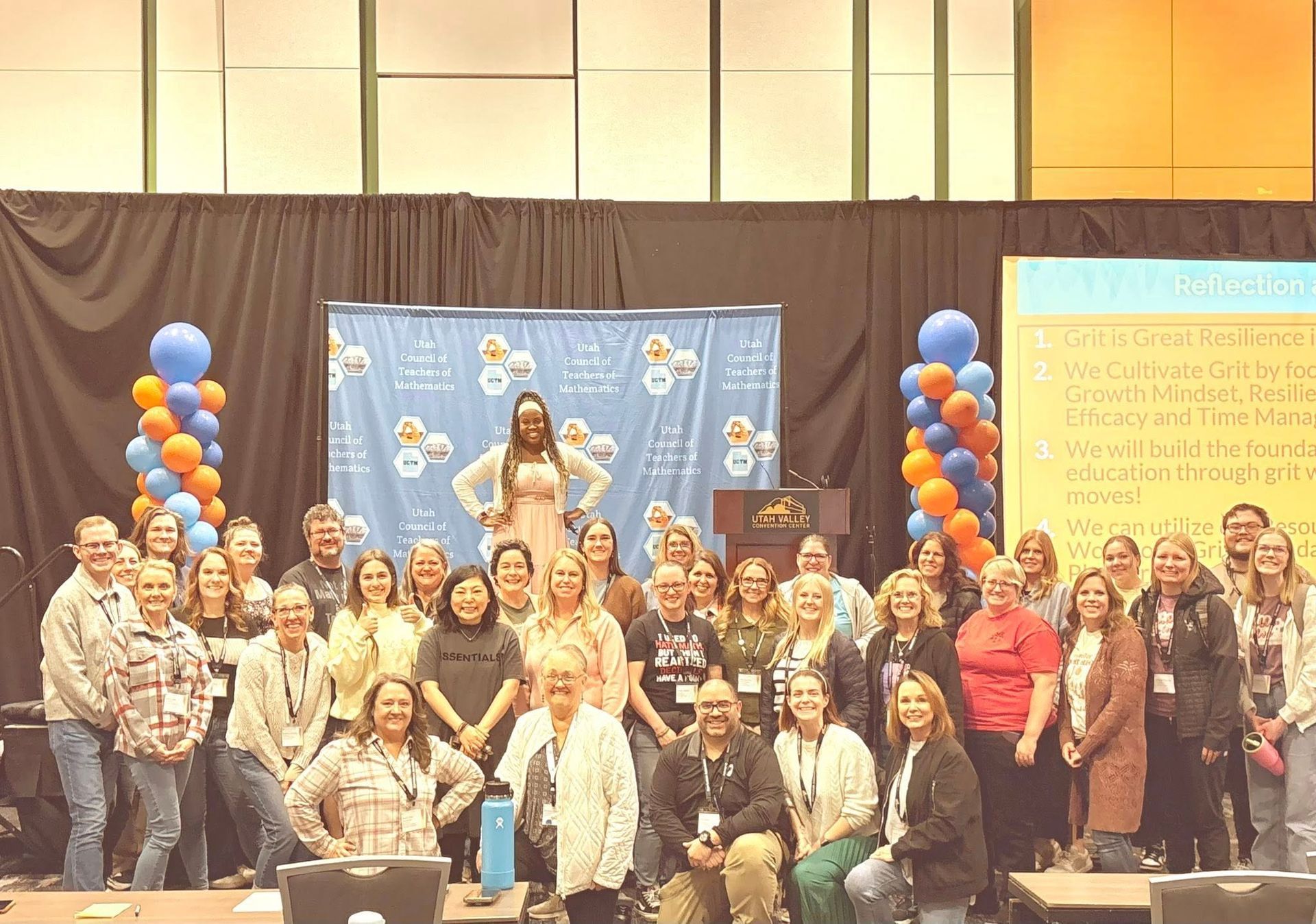
🌟 What an ABSOLUTELY PHENOMENAL time at UCTM presenting on grit games! 🎉 The educators in Utah are truly AMAZING! I feel so blessed to share insights on grit and connect with new friends—cheering each other on to get pumped up again! 💪✨ Had a hilarious time trying to throw hoops with Dan (I only made ONE shot—let’s just say my accuracy needs some work! 😂🏀). It was fantastic to connect with such inspiring friends and leaders in the math community, sharing exciting updates that Savvas has for all the math teachers out there! 📚🔍 BIG shoutout to the UCTM board, Jackie, the Savvas team, and all the incredible Utah educators! Thanks for a blast of a time! 🚀🙌 #GritAndGames #UpliftEducators #MathMagic #ConnectAndInspire #SavvasUpdates #FunInEducation ✨❤️ (I don’t own music copyright)
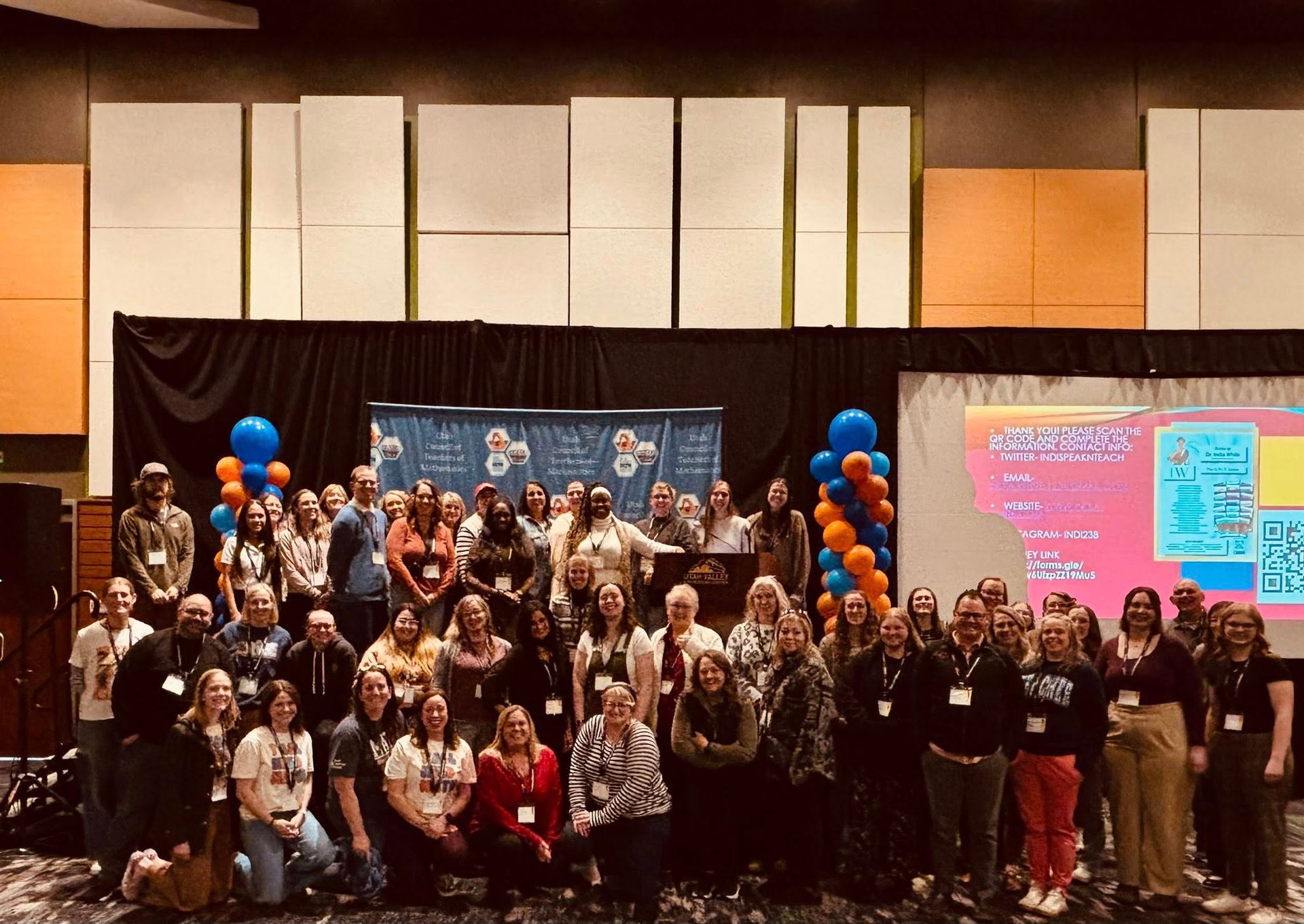
I am incredibly grateful for the opportunity to speak at UCTM 2026. The energy in the rooms was powerful, and several sessions were filled with educators eager to grow, reflect, and strengthen their practice—especially during my session on building gritty thinking in the classroom. Experiences like this remind me why this work matters so deeply. Teachers came ready to engage in meaningful conversations about productive struggle, perseverance, and how to move beyond surface-level engagement into true student thinking. One of the highlights was hearing how excited educators were about the new Savvas math books and the way these resources support conceptual understanding, collaboration, and confidence for learners at all levels. When curriculum, instruction, and mindset align, we truly begin to bridge the gap for students. At the heart of these conversations was the powerful connection between Thinking Classrooms and my G.R.I.T. Framework—Growth Mindset, Resilience, Self-Efficacy, and Time Management. Together, they create learning environments where students don’t just solve problems, they learn how to persist, reflect, and believe in themselves. Building grit starts with a growth mindset. In a thinking classroom, struggle is not a setback—it’s evidence of learning. Teachers can normalize this by celebrating multiple strategies, modeling mistakes, and using language that reframes being “stuck” as part of the thinking process. When students understand that effort and revision are expected, they engage more deeply and take greater ownership of their learning. Resilience grows through collaboration. Thinking classrooms thrive when students work together, share ideas, and wrestle with concepts as a team. Random grouping, structured roles, and intentional math discourse help students learn that perseverance is strengthened in community. When learners support one another, they build confidence and stamina to tackle challenging tasks. Self-efficacy develops when student thinking is valued. Using vertical non-permanent surfaces like whiteboards lowers the fear of making mistakes and encourages risk-taking. Asking students to explain their reasoning and highlighting their ideas—whether complete or still developing—signals that their thinking matters. Over time, students begin to see themselves as capable mathematicians. Time management is another critical component of grit. Teachers can support this by breaking tasks into phases, using visual timers, and guiding students to reflect on how they used their time. These habits help students learn to pace themselves, stay focused, and persist through complex problems—skills that extend far beyond the math classroom. The questions we ask also shape gritty thinking. Instead of rescuing students, we can ask questions that prompt reflection and strategy: What do you already know? What have you tried so far? What could you try next? These questions keep students engaged in the process and strengthen their independence as thinkers. Finally, reflection brings it all together. Ending lessons with opportunities for students to reflect on effort, strategies, and moments of perseverance reinforces that grit is just as important as correctness. When we celebrate persistence as much as achievement, students learn that growth happens over time. UCTM 2026 was a powerful reminder that educators everywhere are committed to creating classrooms where students feel supported, challenged, and empowered. I am grateful for every teacher who showed up ready to learn, collaborate, and push their thinking. Let’s stay gritty, keep learning together, and continue bridging the gap so every learner has the opportunity to thrive.
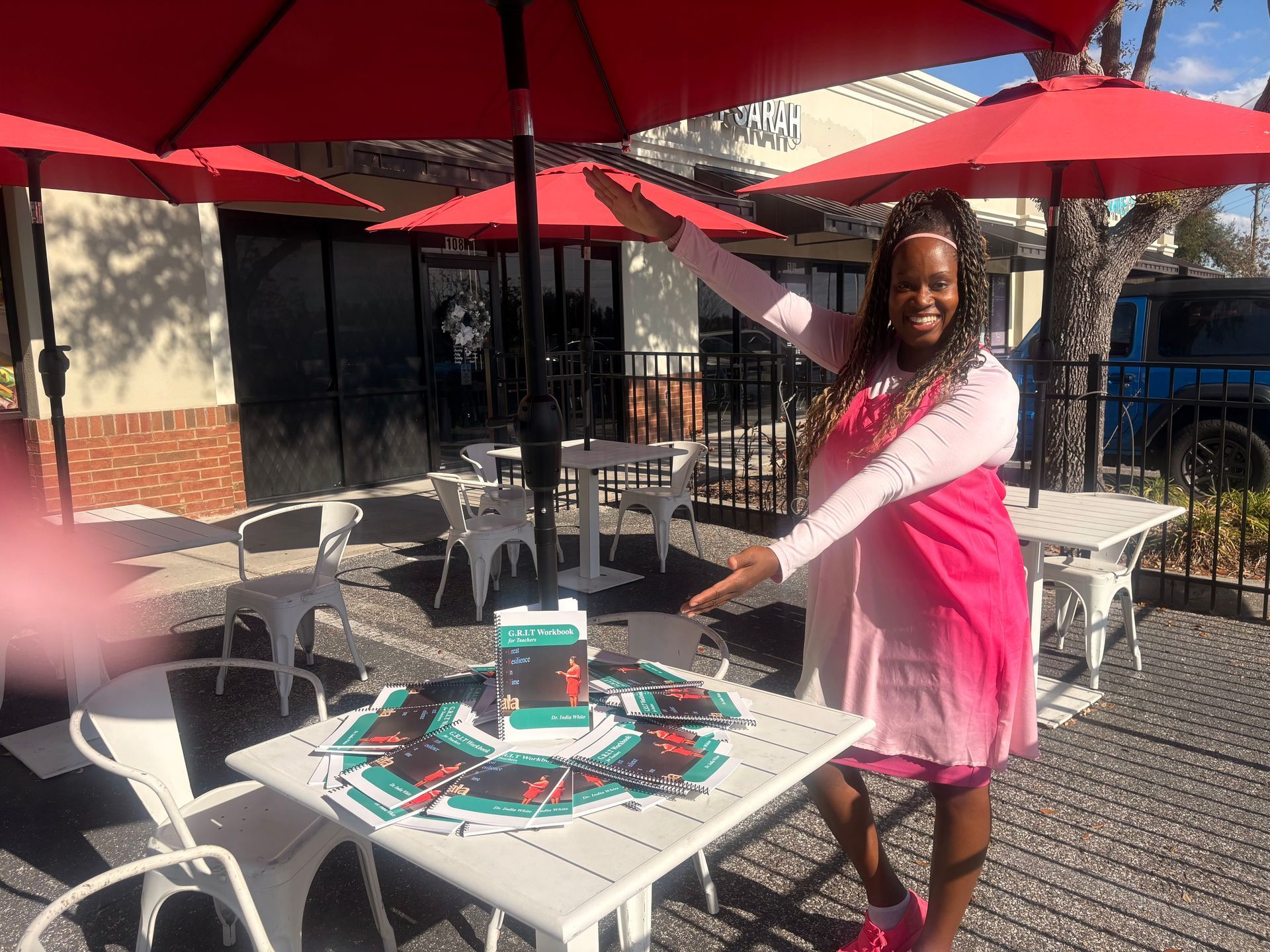
🎉 Exciting news, teachers! 🎓✨ I’m gearing up for an amazing trip to UCTM, and I want YOU to join the fun! Don’t forget to check out my latest video where I reveal some fantastic door prizes that could be yours! 🎁🙌 Let’s connect, learn, and make unforgettable memories together. Click the link and find out how you can win! 🚀💼 👉✨ #UCTM2026 #TeachersRock #drindiawhite #nabse @#foryou (I don’t own copyright to music ) Let’s make this an event to remember! 🙏🎉

It’s Official! The 60-Day Weight Loss & G.R.I.T. Discipline Reset Has Launched 🎉 I’m excited to officially announce the launch of my newest transformational experience—the 60-Day Weight Loss & G.R.I.T. Discipline Reset! This course has been thoughtfully designed for individuals who are ready to stop starting over and finally build the discipline, consistency, and mindset needed to see lasting results. Led by Dr. India White, this 8-week online course goes beyond traditional weight loss programs. It focuses on sustainable change through my proven G.R.I.T. Framework: Growth Mindset, Resilience, Self-Efficacy, and Time Management. This isn’t about extremes or quick fixes—it’s about building habits that fit real life and last well beyond 60 days. What’s Included Participants receive access to: * An introductory video to reset your mindset and set clear expectations * Eight weekly modules that build discipline step by step * A conclusion video to help you transition from a reset to a lifestyle Each week is intentionally structured to help you strengthen both your body and mind, so progress doesn’t disappear once motivation fades. Why This Course Works So many weight loss programs focus only on what to eat or how to exercise—but they ignore the mental discipline required to stay consistent. This course fills that gap. You’ll learn how to: * Stay resilient during setbacks * Manage your time realistically * Build confidence through small, sustainable wins * Create routines that work even on busy days To deepen the experience, I highly encourage participants to pair the course with the 60-Day Weight Loss G.R.I.T. Workbook, available on Amazon. The workbook provides daily reflections, habit tracking, and accountability tools that align with each week of the course. Who This Course Is For This course is perfect for: * Individuals ready to lose weight with structure and purpose * Busy professionals, educators, leaders, and entrepreneurs * Fitness trainers and wellness professionals * Anyone seeking discipline, clarity, and long-term results Enroll Today If you’ve been waiting for the right time to recommit to your health, this is it. The 60-Day Weight Loss & G.R.I.T. Discipline Reset course is now live and ready for you. 👉 Click the link to purchase and enroll today 👉 Start your 60-day reset 👉 Build discipline that lasts a lifetime Your healthiest, most disciplined self is within reach—and G.R.I.T. is the bridge to get you there.
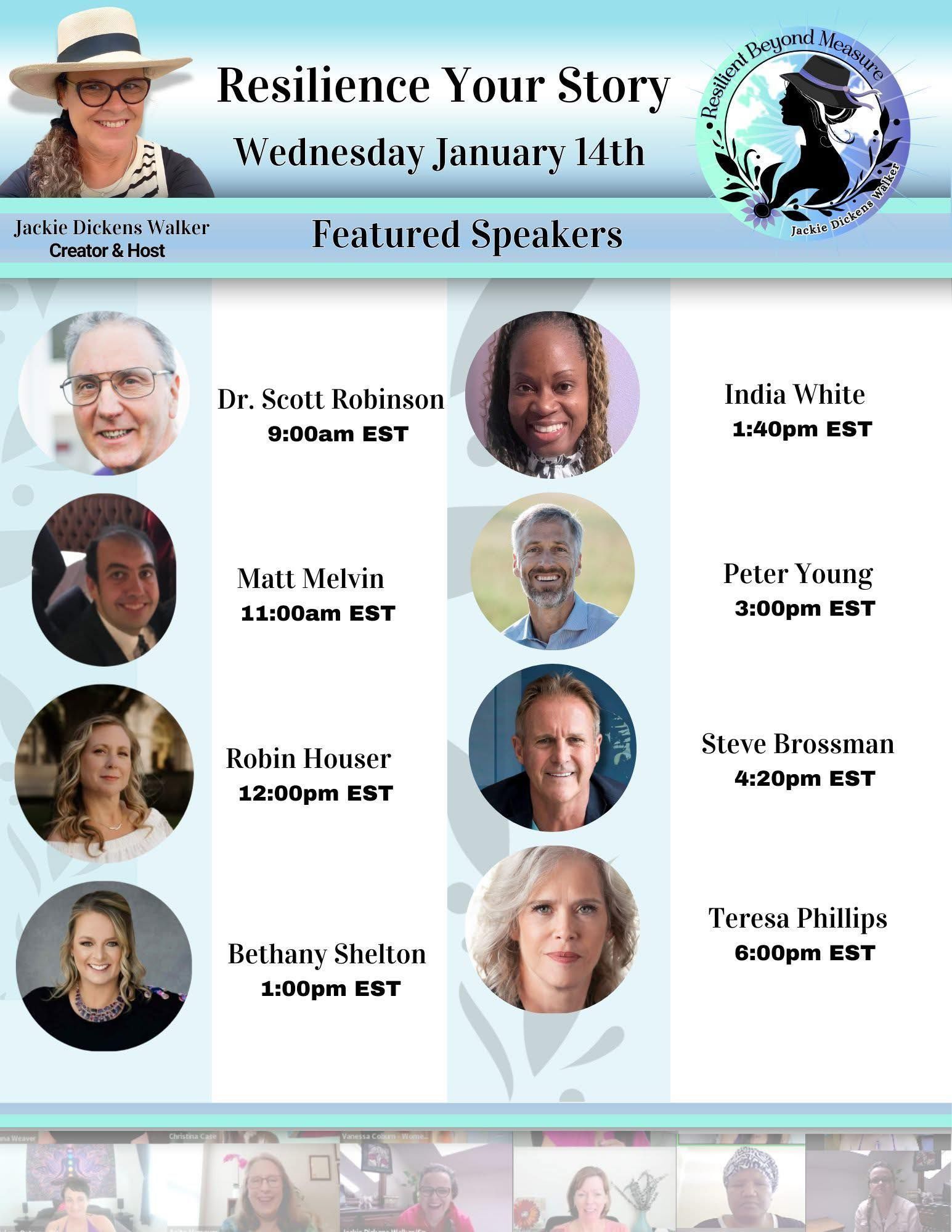
From Homelessness to Hope: Moving from Surviving to Thriving at Resilient Beyond Measure Serving as a keynote speaker at the Resilient Beyond Measure Conference was not only fun, it was deeply meaningful. The room was filled with leaders, educators, and purpose-driven individuals who were hungry for more—more clarity, more impact, and more hope. That collective energy reminded me why I continue to show up and share my story. During my keynote, I spoke candidly about my journey—one that did not begin on a stage, in a boardroom, or with titles behind my name. I shared how I once experienced homelessness, uncertainty, and moments where survival was the only goal. There were seasons when simply making it through the day felt like the win. Yet, through grit, faith, discipline, and relentless perseverance, that season did not define my destination. Today, by God’s grace and years of intentional work, I now serve as a math textbook author, educator, national speaker, and entrepreneur, helping impact millions of students, teachers, leaders, and organizations across the nation. My story is living proof that where you start does not dictate where you finish. At the heart of my keynote was a bold challenge: we must stop normalizing survival mode. Survival is reactive. Thriving is intentional. I shared my G.R.I.T. framework, which continues to be the foundation of my work and message: Growth Mindset — shifting from “I can’t” to “I’m learning” Resilience — developing the stamina to rise again and again Self-Efficacy — believing deeply that you are capable and equipped Time Management — aligning time with purpose, not pressure When these four pillars work together, individuals don’t just cope—they transform. One of the metaphors that resonated strongly with the audience was the idea that many of us are living and leading in low-level energy spaces, when we were designed for more. I described this as moving from survival-level “beta rays” toward higher levels of clarity and impact. Beta represents survival mode —stress-driven, reactive, exhausted, and constantly responding to emergencies. Alpha reflects stability and focus —calmer thinking, reflection, and clearer decision-making. Theta symbolizes creativity and deep connection —innovation, vision, and problem-solving begin to flourish. Gamma represents peak performance and transformation —high-level thinking, purpose, alignment, impact, and legacy. Thriving means intentionally moving away from beta-level survival and stepping into gamma-level living and leadership—where our actions are aligned with purpose, vision, and long-term impact. I want to extend my sincere thanks to Jackie Walker for the invitation and opportunity to keynote such a powerful conference. Resilient Beyond Measure created a space where authenticity, healing, and growth were not just encouraged—they were activated. It was truly an honor to serve and connect with such an inspiring community. I was also excited to share my newest book, Stop Surviving, Start Thriving, which expands on the message of the keynote and provides practical tools to help readers move from burnout to breakthrough. The book is accompanied by a new course designed to walk participants step by step through applying the G.R.I.T. framework in real life—not just reading about it, but living it. In addition, leaders are invited to explore the G.R.I.T. Workbook for Leaders, created to support sustainable leadership, confidence, resilience, and intentional growth. If this message resonates with you, I would love to stay connected. Visit my website at www.india-white.com to learn more about my work, speaking engagements, and resources. Both Stop Surviving, Start Thriving and the G.R.I.T. Workbook for Leaders are available today! Whether you are an educator, leader, entrepreneur, or someone simply ready for more, remember this: you were never meant to just survive. With grit, vision, and intention, thriving is not only possible—it’s your calling. With gratitude and grit, Dr. India White
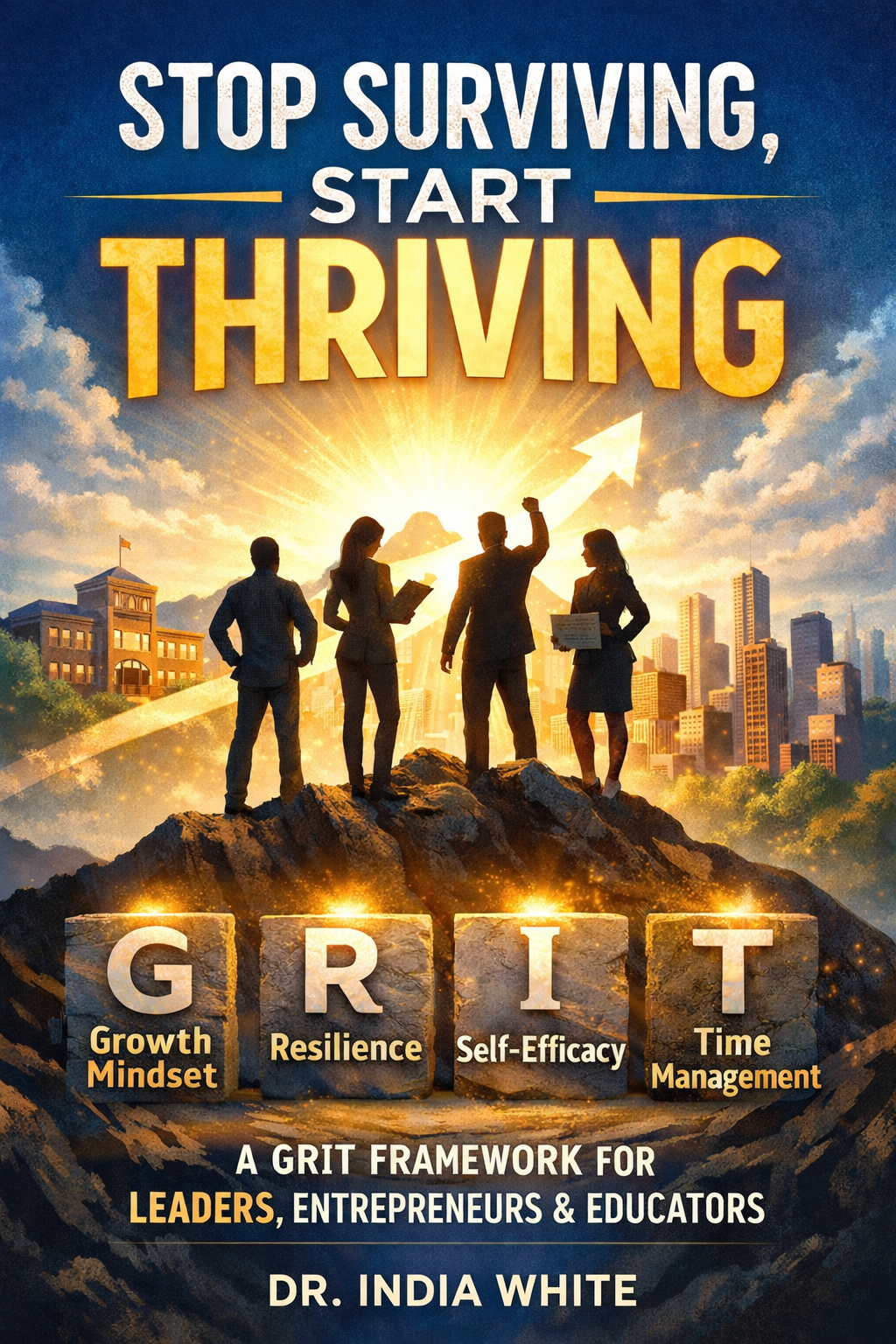
EXCITING NEWS!! I am thrilled to share some incredible news with you all! After months of hard work and dedication, I am proud to announce the launch of my new book, "Stop Surviving, Start Thriving: A Grit Framework for Leaders." This book is designed to empower leaders like you with the insights and strategies needed to elevate your leadership journey and truly thrive in today’s challenging environment. What You’ll Discover in My Book In "Stop Surviving, Start Thriving," I delve into the grit framework that will help you harness your strengths, overcome obstacles, and lead with confidence. Whether you’re an established leader or someone just starting your journey, this book is filled with practical advice and actionable steps to make a meaningful impact. Why This Book Matters: - Transformational Insights: Learn how to shift your mindset from merely surviving to genuinely thriving in your role. - Practical Strategies: Gain access to tools and techniques that you can implement right away to enhance your leadership effectiveness. - Inspiration: Discover stories and examples that will motivate you to take your leadership to the next level. Introducing the Stop Surviving, Start Thriving Course! In addition to the book, I am thrilled to announce the launch of the Stop Surviving, Start Thriving Course! This course complements the book perfectly, providing you with an interactive experience to dive deeper into the concepts covered and gain practical tools that you can use in your daily leadership practice. What to Expect from the Course: - Interactive Learning: Engaging modules that challenge you to think critically and apply lessons to your leadership style. - Real-Life Applications: Practical exercises and discussions that make the concepts relatable and actionable. - Community Support: Join a network of like-minded individuals who are also on their journey to thrive! Where to Find the Book and Course You can grab your copy of "Stop Surviving, Start Thriving" on Amazon by following this link: Amazon Link ( https://a.co/d/c8BNlS9 ). 📖 For those eager to join the course, it's available on my website here: Stop Surviving, Start Thriving Course ( https://www.india-white.com/store/Stop-Surviving-Stop-Thriving-Online-Course-p657410057 ). 🌐 Join Me on This Transformative Journey! I am so excited about this new chapter and can’t wait for you to explore the book and course. Together, let’s stop surviving and start thriving! Your leadership journey begins now. Thank you for your continued support, and I look forward to hearing your thoughts on the book and the course! Let’s thrive together! 💥
